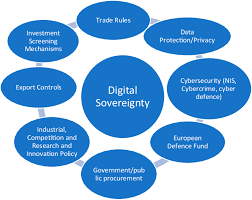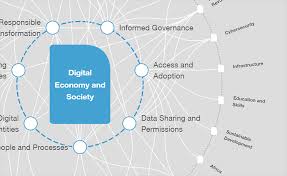In an increasingly interconnected world, where artificial intelligence (AI) is transforming industries, governments, and societies, digital sovereignty has emerged as a critical issue. As countries grapple with the geopolitical implications of AI, control over digital infrastructure, data, and algorithms is becoming as important as control over natural resources once was. This shift is giving rise to a new frontier: AI geopolitics.
What Is Digital Sovereignty?
Digital sovereignty refers to a nation’s ability to control its own digital infrastructure, data, and technologies without undue reliance on foreign entities. It encompasses everything from cloud services and internet governance to cybersecurity and AI development. In practical terms, it means having the autonomy to shape policies that protect citizens’ data, regulate digital platforms, and support homegrown technological innovation.
AI and the New Geopolitical Landscape
AI is no longer just a technological domain—it is a key battleground in global politics. Nations are racing to develop cutting-edge AI capabilities, not only for economic gain but also for strategic dominance. Whoever controls the data, the infrastructure, and the algorithms has a clear advantage in this new era.
This competition has ushered in a new wave of AI geopolitics, where countries are leveraging AI to assert power, protect national interests, and influence global norms. For example, large language models and surveillance technologies are being deployed in ways that reflect the values of the nations that created them. This makes digital sovereignty essential—not only for innovation and economic competitiveness but also for preserving democratic values, national identity, and public trust.
The Role of Data Localization
A central pillar of digital sovereignty is data localization—the practice of storing data within the borders of the country where it is generated. This concept has gained momentum as governments seek to prevent foreign surveillance, ensure compliance with local laws, and foster domestic tech industries.
Data localization can strengthen privacy protections, support national security, and give governments more control over how data is used. However, it also raises challenges. Critics argue that strict data localization laws can increase costs, hinder innovation, and fragment the internet. Balancing these trade-offs is a key challenge for policymakers in the digital age.
Why Digital Sovereignty Matters More Than Ever
The age of AI has made digital sovereignty not just a policy choice but a strategic necessity. Without it, countries risk becoming digital colonies—dependent on foreign technology providers for critical infrastructure and AI capabilities.
Here’s why digital sovereignty matters now more than ever:
Security and Resilience: Nations must protect themselves from cyber threats, misinformation, and manipulation. Sovereign control over digital infrastructure is essential for national defense.
Data Protection and Privacy: In a world where data is the new oil, control over data flows ensures compliance with local privacy regulations and ethical standards.
Economic Independence: Sovereign digital policies support local innovation and reduce reliance on tech giants headquartered abroad.
Cultural and Democratic Integrity: Digital platforms shape public discourse. Controlling them helps ensure that local languages, values, and democratic principles are respected.
Looking Ahead
As AI technologies continue to evolve, the demand for digital sovereignty will only intensify. Nations must invest in building robust digital ecosystems, promoting open yet secure data governance, and fostering international cooperation that respects sovereignty while enabling innovation.
At the heart of this effort lies a crucial balance: enabling global digital trade and collaboration, while safeguarding national interests. In the age of AI, that balance will define the future of not just technology, but of sovereignty itself.







